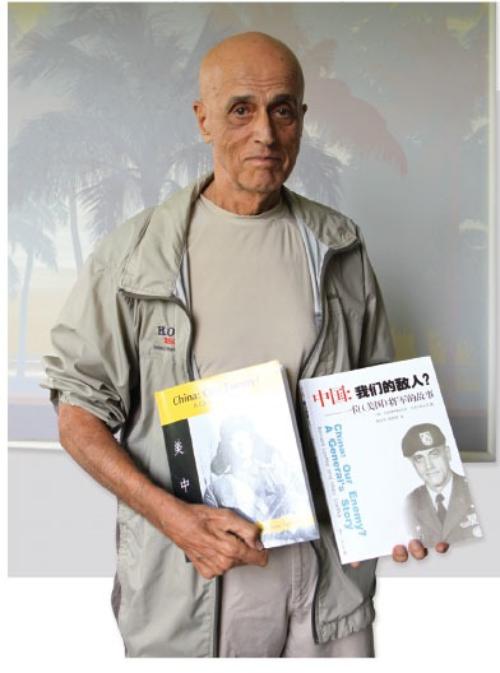 This undated photo shows retired US Army Major General Bernard Loeffke with the Chinese and English versions of his book "China: Our Enemy? A General's Story" at his home in Miami, the United States. (HEZI JIANG / CHINA DAILY)
This undated photo shows retired US Army Major General Bernard Loeffke with the Chinese and English versions of his book "China: Our Enemy? A General's Story" at his home in Miami, the United States. (HEZI JIANG / CHINA DAILY)
While this year marks the 50th anniversary of Ping-Pong Diplomacy, which was started by table tennis players from the United States and China and led to sports and cultural exchanges between the two nations, retired US Army Major General Bernard Loeffke remembers how things were before that breakthrough.
During the Vietnam War, the 1957 graduate of the US Military Academy at West Point was wounded by Vietnamese forces, who were trained and equipped by China.
His first indirect contact with China caused a physical wound, but his subsequent contacts with China changed his views of the country and led him on a path of promoting friendship and understanding between the two peoples.
I am afraid of making a strong China anything else than a friend. I am afraid of leaders who will make us things other than friends.
Retired US Army Major General Bernard Loeffke
ALSO READ: General turns peacemaker
In 1973, as director of the White House Fellows, Loeffke visited China for the first time. During that trip, he shook hands with Chinese General Xu Xin, who was wounded by US fire as the commander of Chinese volunteers in the war on the Korean Peninsula between 1950 and 1953.
In 1982, Loeffke became the first US Army general assigned to the US embassy in China as defense attache. In three years, he made some Chinese friends and learned Mandarin.
During that time, Loeffke became the first foreigner to jump with Chinese paratroopers. He also helped US runner Stan Cottrell to set up a run from the Great Wall to the southernmost part of China.
From his home in Hollywood, Florida, in emails and phone conversations, he fondly recalled some warm person-to-person experiences he had when he was in China.
"In the 1980s, my Chinese hosts who knew my background as a competitive swimmer went out of their way to honor that title. One time in the winter in one of the northern provinces, I was taken to an Olympic-size swimming pool. I was introduced to one of their national champions and asked if I wanted to do an exhibition race. I agreed. The Chinese athlete was in his teens and I was in my 40s," Loeffke said.
"We swam four lengths of the pool. The Chinese swimmer, seeing that I was hopelessly behind, faked bad turns that allowed me to catch up. We finished together and the foreigner exited the pool without losing face," he said, fondly calling that experience his personal "swimming diplomacy".
Since his service at the US embassy in China, Loeffke has become an active advocate for peace and friendship between the US and Chinese peoples. He even took his son and daughter to China to teach Chinese children English and theater.
In 2012, to celebrate the 40th anniversary of the White House Fellows, Loeffke published the book China, Our Enemy? A General's Story, in which he documented his experiences in China. In that year, he also set up a US$10,000 annual Friendship Fund at West Point to send cadets to China for three weeks in the summer. Since then, scores of cadets have volunteered in China to teach preventive medicine to elementary school children.
With relations between the US and China having deteriorated in recent years, the program was ended. Loeffke is now establishing an annual award program at Fudan University in Shanghai to continue to foster better understanding between the two peoples.
READ MORE: Time to repair, reconnect ties
He wants to dedicate the award to someone who has done the most to help the community or a student who writes the best essay on improving relations with the US.
"But in 2020 we labeled China as enemy No 1. Today is not 1972 and I am hopeful that we will soon improve relations. We have dropped enemy and changed to competitor. We can do better. There are many ways we can cooperate. Climate change, pandemics, exploration of space are but a few," Loeffke said.
Loeffke isn't afraid of a strong China. "I am afraid of making a strong China anything else than a friend. I am afraid of leaders who will make us things other than friends," he said.
To avoid that, "I want to do all I can to improve relations", Loeffke said.


